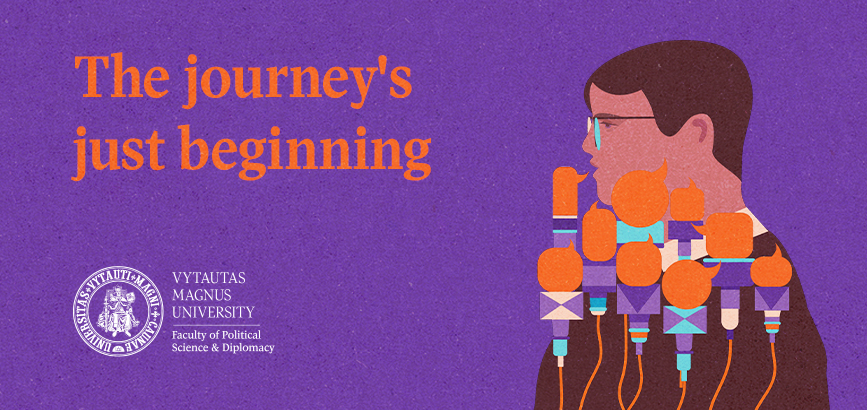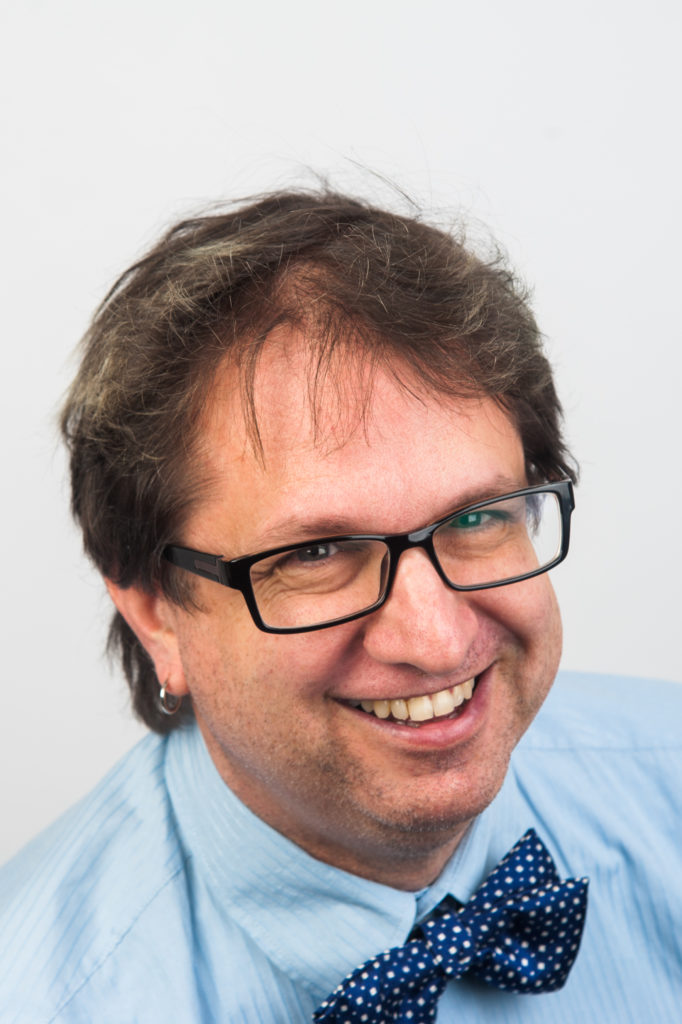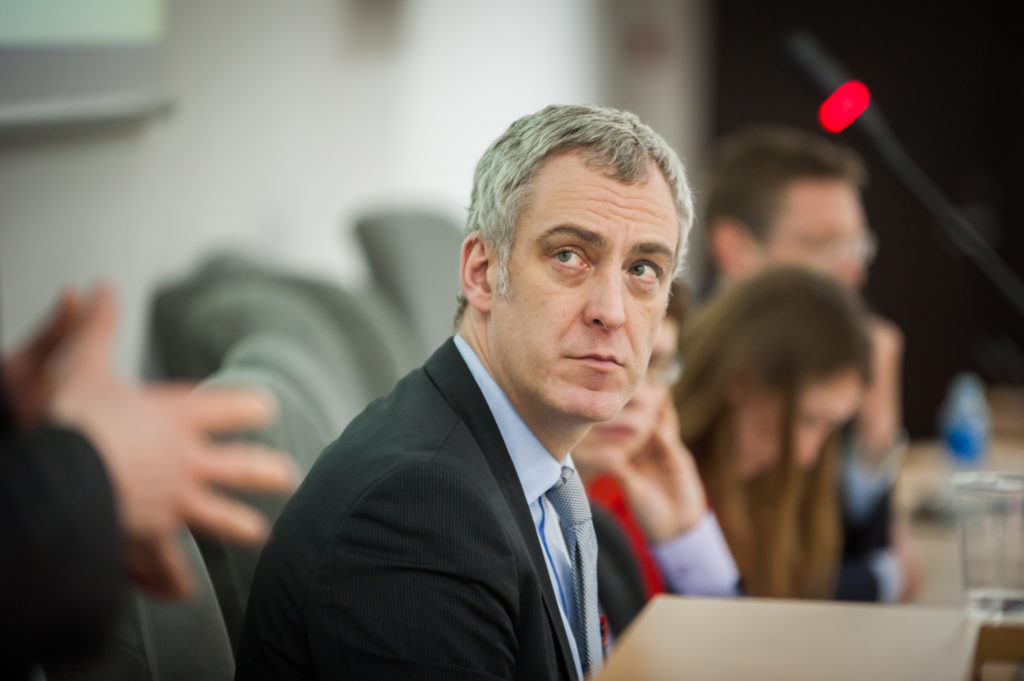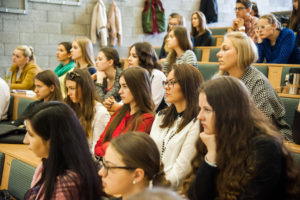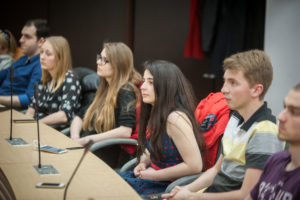Impressions from the faculty days
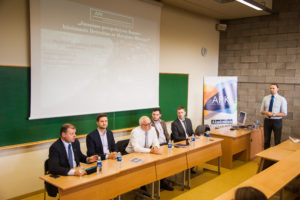 On 3-7 May Faculty of Political Science and Diplomacy (PMDF) organized Faculty days, which included many interesting events for both potential and current students. Since a great part of events was held in English, international students were also welcome to participate.
On 3-7 May Faculty of Political Science and Diplomacy (PMDF) organized Faculty days, which included many interesting events for both potential and current students. Since a great part of events was held in English, international students were also welcome to participate.
“Failure is good”
First day started with a warm welcome from Faculty’s vice dean Giedrius Česnakas to the high-school students, right before the torch was picked up by associate professor Jaq Greenspon. His friendly manner and American accent immediately allowed students to feel the international spirit of the faculty. Mr. Greenspon was talking about living dreams and achieving goals, encouraging students to leave their comfort zone as much as possible and learn from failures. According to him, failure is important, because “if you are not failing you are not trying”. The professor shared his own experience of leaving the comfort zone, which allowed him to become a writer and move from the US to Europe. He explained his choice of VMU by the opportunity to teach in English students from all over the world: “For me that was the selling point. Being at the place where all those countries will come to me is awesome. It opens me up for learning. Every semester is new. Every semester is a challenge because I do different things.”
Answering the question about his purple hair, Jaq said: “If you come and take my class on rhetoric I will give you all the tools you need to convince your parents to let you dye you hair”.
The best illustration of Jaq’s words about the countries, coming to you, were international students, who came to talk about their motivation of choosing VMU and their experience of living in Lithuania. The big international family of the PMDF was represented by students from USA, the Emirates, France, Russia, Turkey and Bulgaria.
“I wanted to track how Lithuanian people really see Russia”
On the same day visiting lecturer from University of Paris 8 Matthieu Grandpierron held two lectures on French ways to solve crisis in the developing countries and French diplomacy. He noted on the switch from the material conflict to the ideas conflict, which is much more difficult to solve. Mr. Grandpierron compared strategies, France used for its interventions in Africa, emphasizing on the importance of media support in any kind of operations. Liberating the country by force, in his opinion, is much easier than trying to assess social issues, change political system or to make all the ethnical groups within one state to live in piece, and that’s where “liberators” usually fail. French guest also answered questions about these and other hot topics, such as terrorism, French-Russian relationship, growing radicalism etc.
One of the reasons of Matthieu Grandpierron’s visit to Lithuania was his desire to see “How Lithuanian people really see Russia: as a threat or as an opportunity”.
Although his university is linked to the French Ministry of Defense, for which Matthieu has done research, he stressed, that he doesn’t necessarily have to support its official position: “Firstly, I am a researcher. I am here as a researcher, so I don’t need to bother with the official discourses”
Mock Model UN
The main event of the second day of PMDF days was a mock version of a Model UN, hosted by the United Nations Student Club. The topic of the event was War in Syria. For 2 hours Lithuanian and international students became representatives of US, Turkey, Syria, Russia, Saudi Arabia, France, Germany, Israel, Iraq and Canada.
It was a fun exercise familiarizing students with how a Model UN works and enabling them to decide if they would like to participate in a real Model UN session held on May 25-26 in VDU (https://www.facebook.com/events/1725060061074262/).
The third day
The third day had probably the busiest schedule. Two public lectures were held by the lecturer of Nicolas Copernicus University in Toruń habil. dr. Antonina Kozyrska. During the first lecture she provided the audience with the insights into the complicated religious situation in Ukraine after 1991. The lecturer also talked about the situation during Euromaidan events, noting that all the churches have common position in terms of restoring of peace, national unity and territorial integrity of the country. The second lecture was devoted to the decommunization process in Ukraine, which started from 2015 and includes removal of communist monuments and renaming of public places named after communist-related themes.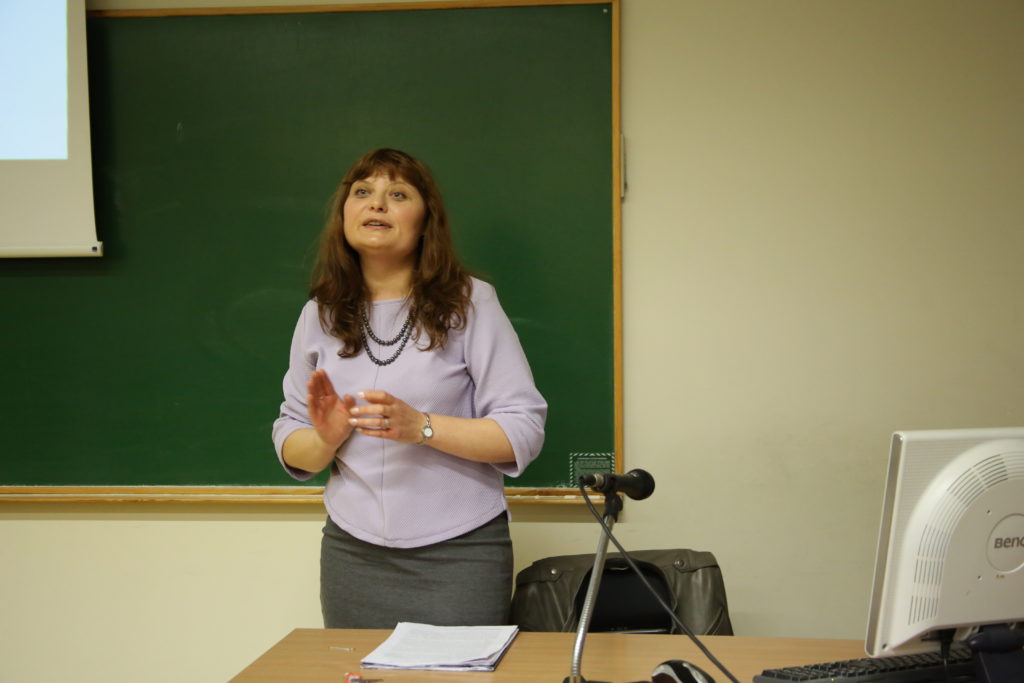
On the same day another lecturer from Nicolas Copernicus University habil. dr. Dorota Michaluk held a lecture on the historical memory of the Belarusian minority in Poland, which is mostly concentrated in Bialystok region. According to her, historical memory of Belarusians minority is different from historical memory of not only Poles but also Belarusian inhabitants of Belarus, resulting in absence of close spiritual ties with the latter.
“One page of information in your CV is better than 3-4 pages of nonsense”
The day continued with the special seminar “Career Opportunities in International Organizations”, organized by the American studies club. The Head of NATO Arms Control and Coordination Section William Alberque visited PMDF already for the second time. With a degree of humor and artistry he told students about his work experience and gave them some useful tips about how to start career in an international organization.
Thus, according to Mr. Alberque, it is important to decide what you are interested in and to attend different events, such as conferences and public speeches. He also recommended to read papers on the topics, which are interesting for you, as well as writing you own ones, which look good on CV. Another important thing, according to him, is field work and internships, which usually are more valuable than degrees. Mr. Alberque emphasized on the importance of networking, making contacts and meeting people, who could recommend you in the future, as well as exploiting national connections (people, who represent your country on the international arena) “mercilessly”. He noted that it is important to show what you can do to differentiate, to think fast and learn languages, which are a big advantage (Fluent English + Russian/Russian/Chinese/Arabic). Mr. Alberque also gave students some tips on writing resume, in particular, to make it brief (“one page of information in your CV is better than 3-4 pages of nonsense”) and base it on the description of the position, you are applying for. He also advised not to forget about social media, as applicant’s accounts are always looked through.
Besides this seminar, during PMDF days the American studies club also organized the lecture of W. Alberque “NATO’s Role in Crisis Management”, as well as Movie evening+discussion about film “Zero Dark Thirty”.
One of the organizers Gerda Jakštaitė called the events successful, emphasizing on the activity and motivation of the students, as well as the “great and cozy” atmosphere, which was the aim of organizers. According to her, the main difficulty was to get appropriate venue for the events, however, “the faculty was helpful, as always, especially administrators”.
Written by Anton Chernetskyi (student of the Faculty of Political science and Diplomacy).




